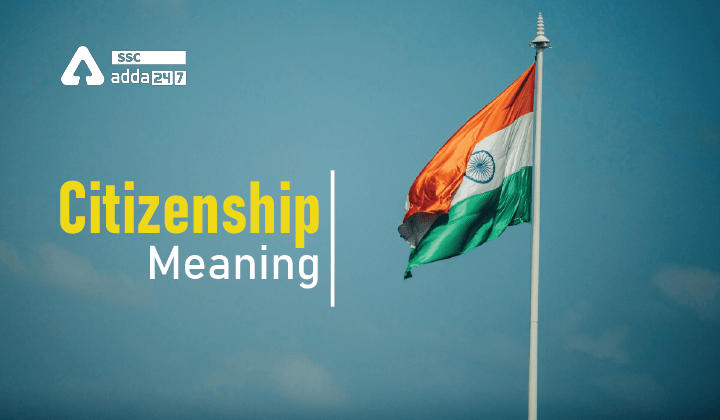Table of Contents
Citizenship Meaning
Citizenship is the stature of a person recognized under law as being a legal member of an independent state or belonging to a nation. In Indian Constitution, Articles 5 – 11 deal with the concept of citizenship. Citizenship is to become a lawful resident of the country. Citizenship of the country can be earned by meeting all the legal requirements of a national, state, or local government as per the rules. A nation grants certain rights and privileges and citizens are expected to follow their country’s laws and protect the nation against its enemies. Citizenship meaning is to get legal residence power if the country and protect the laws and orders of the particular country.
Citizenship in India
Citizenship in India is provided as per the rules of the Constitution. The individual need to fulfill all the requirements to get citizenship in a country. In Indian Constitution, the articles are made for Indian Citizenship as per the Government rules. The citizens must follow fulfill these criteria to get citizenship in a country legally. The citizenship of India is mentioned in Articles 5 to 11 in the Indian Constitution.
Article 5 : Citizenship at the commencement of the Constitution
As per this article, citizenship for people at the advent of the Constitution, i.e. 26th January 1950. Under this, citizenship is granted to those persons who have their domicile of Indian territory and –
- Who was born in Indian territory or
- Whose either parent or guardian was born in Indian territory or
- Who has ordinarily been a citizen of India for not less than 5 years directly preceding the origin of the Constitution?
Article 6 : Citizenship of Individuals who have migrated from Pakistan
Any person who has migrated from Pakistan shall be a citizen of India at the time of the conception of the Constitution if –
-
- He/she or either of his/her parents or any of his grandparents was born in India as assigned in the Government of India Act of 1935; and
- (a) In case a person has migrated before July 19th, 1948, and has been a resident of India since his migration, or
(b) If a person has migrated after July 19th, 1948 and he has been got legal citizenship of India by Government. On that behalf by the government of the Dominion of India on a request made by him to such an officer before the commencement of the Constitution, provided that no person shall be so registered unless he has been resident in India for at least 6 months immediately foregoing the date of his application.
Article 7 : Citizenship of certain migrants to Pakistan
This article related to the rights of people who had migrated to Pakistan after March 1, 1947, but thereafter returned to India.
Article 8: Citizenship of certain persons of Indian origin residing outside India
The article deals with the rights of people of Indian origin living outside India for intentions of employment, marriage, and education.
Article 9
This article deals with the people voluntarily adopting citizenship in a foreign country who will not be citizens of India.
Article 10
Any person who is assessed a citizen of India under any of the provisions of this Part shall continue to be a citizen and will also be subject to any constitution made by the Parliament.
Article 11 : Parliament to regulate the right of citizenship by law
The Parliament has the right to make any provision about the gain and termination of citizenship and any other issues relating to citizenship.
Citizenship of India constitutional provisions
- Citizenship in India is governed by Articles 5 – 11 (Part II) of the Constitution.
- The Citizenship Act, 1 of 955 is the statute dealing with citizenship. This has been amended by the Citizenship (Amendment) Act 1986, the Citizenship (Amendment) Act 1992, the Citizenship (Amendment) Act 2003, and the Citizenship (Amendment) Act, 2005.
- Nationality in India mostly follows citizenship by right of blood and not jus soli (citizenship by right of birth within the territory).
Citizenship Act, 1955
Citizenship of India can be obtained in the following ways:
- Citizenship at the origin of the Constitution
- Citizenship by birth
- Citizenship by descent
- Citizenship by registration
- Citizenship by naturalization
- By incorporation of territory (by the Government of India)
- People who were domiciled in India on 26th November 1949 automatically became citizens of India by citizenship at the origin of the Constitution.
- Persons or Individuals who were born in India on or after 26th January 1950 but before 1st July 1987 are Indian citizens.
- A person born after 1st July 1987 is an Indian citizen if either of the parents was a citizen of India from birth.
- Persons born after 3rd December 2004 are Indian citizens if both parents are Indian citizens or if one parent is an Indian citizen and the other is not an illegal migrant at the time of birth.
- Citizenship by birth is not applicable for children of foreign discreet personnel and those of enemy aliens.
Overseas Citizenship of India
Overseas Citizenship of India (OCI) is a form of permanent residency attainable to people of Indian origin and their husbands which allows them to live and work in India indefinitely. Despite its name, overseas citizenship of India status is not citizenship and does not grant the right to vote in Indian elections or hold civil office.
Overseas Citizenship of India is of immigration importance authorizing a foreign citizen of Indian origin to live and work in India for an uncertain period. The OCI card was launched by the Government of India to fulfill the demands of the Indians residing overseas who maintained dual citizenship.
Overseas Citizenship of India : Eligibility
The citizens must fulfill the requirements listed below to get Overseas Citizenship in India.
- A citizen of a foreign country who was an Indian citizen during or after the advent of the Constitution;
- A citizen of another country who was eligible to become an Indian citizen during the origin of the Constitution;
- A citizen of another country who was concerned with a province that became a part of India after August 15, 1947;
- A child, grandchild, or great-grandchild of any of the three above-mentioned citizens;
- A minor child of any of the four above-mentioned persons;
- A minor child whose parents are both Indian citizens;
- A minor child whose only one parent is an Indian citizen;
- A foreign wife of an Indian citizen who has been married for at least two years before applying for an OCI card;
- A foreign spouse of an OCI cardholder registered under section 7A who has been married for at least two years before applying for an OCI card.
Termination of Citizenship
The termination of citizenship can be made in the following ways:
- Renunciation: If any citizen of India who is also a national of another country denies his Indian citizenship through a declaration in the prescribed manner, he ceases to be an Indian citizen. When a male person vanishes to be a citizen of India, every minor child of his also ceases to be a citizen of India. However, such a child may within one year after achieving full age become an Indian citizen by making a declaration of his intent to resume Indian citizenship.
- Termination: Indian citizenship can be terminated if a citizen consciously or voluntarily acquires the citizenship of any foreign country.
- Deprivation: The government of India can restrain a person from his citizenship in some cases. But this does not apply to all citizens. It is applicable only in the case of citizens who have acquired citizenship by registration, naturalization, or only by Article 5 Clause (c) (which is citizenship at birth for a domicile in India and who has ordinarily been a resident of India for not less than 5 years immediately coming first the origin of the Constitution)
Citizenship Portal
The citizenship portal is an online platform on which citizenship and its related services see provided to citizens. The citizens who want to get legal citizenship in India can get all the details and requirements on the citizenship portal.
Citizenship for Indian Global Citizenship
Global citizenship is the term for social, political, environmental, and economic actions of globally minded individuals and communities on a worldwide scale. You must follow the below-mentioned criteria to get citizenship for Indian Global citizenship.
- Create your Trusted Traveler Programs (TTP) account.
- Log in to your TTP account and complete the application process
- After completing your application and fee, CBP will review your application.
Benefits of Indian Global Citizenship
There are many benefits of Citizenship for Indian Global Citizenship. The benefits are listed below.
- Build their awareness of world events.
- Think about their values and what’s significant to them.
- Take realizing into the real world.
- Challenge ignorance and prejudice.
- Get accused in their local, national, and global communities.
- Develop an assertion and voice their opinions.
Citizenship Calculator
A citizenship calculator is a tool used to check whether the citizens satisfy the requirements and eligibility to get citizenship in a country. Citizens can use the citizenship calculator to check their eligibility for citizenship.
Citizenship Meaning in Hindi
Citizenship is the legal right to get permanent residence in the country. The citizenship meaning in Hindi is termed ‘Nagrikta’. Individuals need to fulfill all the requirements to gain citizenship in an individual country.
You may also like to read:
| Longest River in India | Largest State of India |
| Dams in India | Important lakes of India |
| Important Days In August 2022 | Important Days In November |
Citizenship Meaning – FAQs
Que.1 Define Overseas Citizenship of India?
Ans – Overseas Citizenship of India is defined as a form of permanent residency available to people of Indian origin and their spouses which allows them to live and work in India indefinitely.
Que.2 Is citizenship can be terminated?
Ans – Yes, the citizenship of a country can be terminated if the citizen violates the laws and orders of the country and does not show respect for the country.
You May Also Read this:


 Govt Jobs 2024, Latest Upcoming Governme...
Govt Jobs 2024, Latest Upcoming Governme...
 Upcoming Government Exams, Complete Govt...
Upcoming Government Exams, Complete Govt...
 RPF Constable Recruitment 2024 Notificat...
RPF Constable Recruitment 2024 Notificat...






